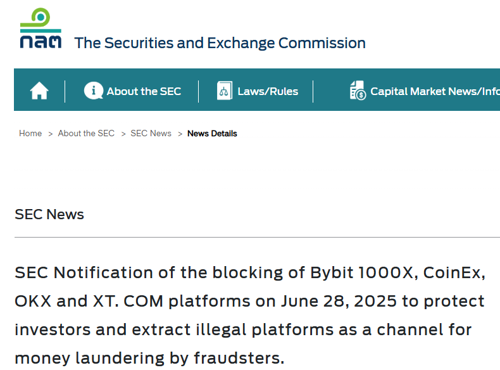
EEA MiCA-licensed crypto exchanges are being banned in Thailand for failing to prevent AML and fraud
17/06/2025
Bybit and OKX, along with three other exchanges, are about to be banned in Thailand for failing to prevent AML and fraud, yet both have managed to secure MiCA licenses.

Bybit and OKX hold a MiCA license, which allows them to operate in all 30 countries in the European Economic Area (EEA).
- Bybit got its MiCA license through Austria last month, and
- OKX got its MiCA license from Malta in January.
MORE…
Thailand’s financial regulators have blocked access to five major crypto exchanges to curb local money laundering.
- The changes will come into play next month, with OKX and Bybit among the axed platforms.
- Despite the hit to local exchanges, Thailand continues to explore ways to innovate within the digital assets sector.
- Earlier this week, Thailand officials announced a potential initiative allowing tourists to spend crypto via a debit card at local merchants.
- As much of the world begins pondering progressive crypto regulation, Thailand has dealt a significant blow to its local industry, banning five big trading platforms from operating within the nation.
Thailand’s Securities and Exchange Commission slashed 1000X, OKX, Coinex, Bybit and XT earlier today.
- The move will become official on June 28th, when the country’s Ministry of Digital Economy will block exchange access.
- Just over a year ago, Thailand’s SEC hinted at such a policy when it began targeting ‘unlicensed crypto exchanges’ in response to rising digital crime.
- Now, the regulators have brought the hammer down on five of the nation’s popular exchanges as a preventive measure against money laundering.
- This is to protect investors and stop using unauthorised digital asset trading platforms as a money laundering channel.
- Despite a potential step backwards for the Thailand crypto industry, the government hasn’t been as crypto-averse as the news suggests.
- Just a few days ago, the nation announced they are planning to greenlight crypto-loaded debit cards for tourists.
- Vendors within the region will still receive Thailand’s fiat currency – the Thai baht – while international travellers can link their crypto holdings.
- Additionally, Thailand’s Finance Minister spoke of potential reforms coming to the current regulatory framework surrounding capital markets.
- Part of this shifting regulation includes issuing USD 150 million (AUD 233 million) tokenised Government bonds for retail investors.
Source
The Team
Meet the team of industry experts behind Comsure
Find out moreLatest News
Keep up to date with the very latest news from Comsure
Find out moreGallery
View our latest imagery from our news and work
Find out moreContact
Think we can help you and your business? Chat to us today
Get In TouchNews Disclaimer
As well as owning and publishing Comsure's copyrighted works, Comsure wishes to use the copyright-protected works of others. To do so, Comsure is applying for exemptions in the UK copyright law. There are certain very specific situations where Comsure is permitted to do so without seeking permission from the owner. These exemptions are in the copyright sections of the Copyright, Designs and Patents Act 1988 (as amended)[www.gov.UK/government/publications/copyright-acts-and-related-laws]. Many situations allow for Comsure to apply for exemptions. These include 1] Non-commercial research and private study, 2] Criticism, review and reporting of current events, 3] the copying of works in any medium as long as the use is to illustrate a point. 4] no posting is for commercial purposes [payment]. (for a full list of exemptions, please read here www.gov.uk/guidance/exceptions-to-copyright]. Concerning the exceptions, Comsure will acknowledge the work of the source author by providing a link to the source material. Comsure claims no ownership of non-Comsure content. The non-Comsure articles posted on the Comsure website are deemed important, relevant, and newsworthy to a Comsure audience (e.g. regulated financial services and professional firms [DNFSBs]). Comsure does not wish to take any credit for the publication, and the publication can be read in full in its original form if you click the articles link that always accompanies the news item. Also, Comsure does not seek any payment for highlighting these important articles. If you want any article removed, Comsure will automatically do so on a reasonable request if you email info@comsuregroup.com.


